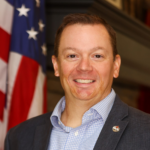Earlier this year, our suburban Nashville school district received exciting news from the Tennessee Department of Education: We won a $15.5 million grant to create another resource for our students’ workforce training needs. We’re calling it the Innovation Hub, since it will bring together students, educators, community members and local industry to reimagine the traditional high school experience.

The grant acknowledges our district’s broad vision of a 21st-century education that blurs the lines between workforce development and traditional high-school knowledge- and skill-building. When it opens in 2026, the hub will serve students from across the district as they prepare for the high-tech, high-demand jobs in fields like aviation, hospitality, business leadership, industrial arts and tech. Rather than repurposing an outdated building, we’re designing the hub from the ground up to operate like a workplace — with open concepts, flexible learning spaces and the same real-world technology that workers use on the job.
Perhaps most importantly, the Innovation Hub will provide significant opportunities for local industry and community members to engage meaningfully with students both as mentors and partners. These authentic relationships between students and industry won’t be peripheral to the student’s experience in the Innovation Hub. They’ll be central to its design, which expands on the success of the district’s partnerships with the business community. We already have entrepreneurship education programs that are central to our career and technical education programs and its Entrepreneurship and Innovation Center. These, in many ways, are the predecessor to the Innovation Hub.
What entrepreneurship education looks like
Schools have partnered with their local business communities for years. However, the ways in which I’ve seen traditional industry “volunteer” roles morph from appearances at career day events into relationships that transform both students and businesses as part of our INCubatoredu entrepreneurship program has changed my perception of the power of these partnerships.
The courses, developed by the nonprofit Uncharted Learning, pair real entrepreneurs and business experts with teams of student entrepreneurs. These teams create and develop a product or service that solves a problem they’ve identified in their communities, then pitch those ideas to actual investors willing to help fund their ideas. Often, students complete the course with a startup. But even those who don’t launch a business learn valuable lessons about hard work, perseverance and rebounding from setbacks.
Students in the program learn a lot from their mentors, but the benefits flow both ways. The mentors and coaches who work with these students would tell you that they not only build community, they also discover that young people often hold solutions to the challenges their businesses face.
Our students worked with the Tenn. Titans
Take, for instance, the contributions of our students to the Tennessee Titans, the NFL franchise in Nashville. Team officials noted that too few young people were engaging with the team, something that was especially notable through social media. A partnership between the students and Titans officials led to Spirit Week, an event the students created to boost engagement among Gen Z. Their plan included a dedicated student section in Nissan Stadium for the Spirit Week game, along with kid-created content for the stadium’s screens.
The project was a huge success, in part because Titans personnel treated the students as professionals (which, in a sense, they were). It could have been just another busy-work project for the students and the Titans. Instead, both mentors and mentees benefitted tremendously.
Through INCubatoredu, our students have also worked closely with employees of Fourth Capital, a locally owned bank in the Nashville area that supplies coaches, mentors and judges for pitch day competitions. NXT Level Recruiting, a headhunting firm, has also been active at the Entrepreneurship and Innovation Center, helping future creatives hone their skills in video game design, film production, sound engineering and other fields by judging projects submitted during the FoundersLive adult pitch night.
Continual support from the community
Williamson Inc. — which blends the Williamson County Chamber of Commerce and economic development — has provided our students with coaches, mentors and exposure to local businesses through monthly meetings at the center. Some of our student entrepreneurs even want their newly launched businesses to join. And Downtown Franklin Association, a group for downtown merchants, supports students by connecting them to its members. In fact, one team will use a local hotel kitchen to bake vegan items and possibly sell them there.
In each instance, authentic engagement between students and the business community benefitted both groups — an outcome that breaks the traditional high school education mold.
Kari Niedfeldt-Thomas, managing director of corporate insights and engagement at Chief Executives for Corporate Purpose, told The Associated Press recently that volunteer efforts are more successful when the corporate world approaches it “not as ‘I’m helping you,’ but with a lens of, ‘We’re in a partnership about making our community a better place.’ That levels the playing field. It doesn’t make it charity. It makes it a relationship.”
I couldn’t agree more. Modern-day entrepreneurship education and projects like our Innovation Hub do more than provide students with the skills they’ll carry with them to college or the workforce. By making students full partners in this work, “volunteers” can leverage the students’ enthusiasm, creativity and unique perspective for the betterment of their businesses — while also helping the next generation prepare for tomorrow’s workforce challenges.
Jeremy Qualls is executive director of the Entrepreneurship and Innovation Center and College, Career & Technical Education in Williamson County Schools in Franklin, Tenn. The district uses entrepreneurial education curriculum from Uncharted Learning.
Opinions expressed by SmartBrief contributors are their own.
_________________________
Subscribe to SmartBrief’s FREE email ASCD newsletter to see the latest hot topics in education. It’s among SmartBrief’s more than 250 industry-focused newsletters.
